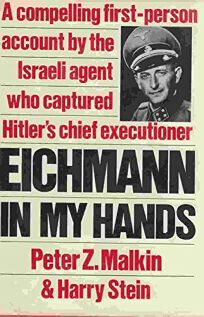![The Man Who Captured Eichmann [DVD] [1996] [Region 1] [US Import] [NTSC]](https://images-na.ssl-images-amazon.com/images/I/61521252F2L._SX342_.jpg)
The Man Who
Captured Eichmann is a historical drama (based on a true story) which
premiered on US television (TNT) in 1996. It is the story of how the former
high-ranking Nazi official Adolf Eichmann was captured by Israeli agents in
Argentina and secretly transported to Israel. Here is some basic information:
** Director:
William A. Graham
** Writer: Lionel
Chetwynd
** Based on the book Eichmann in my Hands by Peter Malkin and Harry Stein
** Run time: 96
minutes
The cast includes
the following:
** Robert Duvall
as Adolf Eichmann // Ricardo Klement (1906-1962) – a former high-ranking Nazi
official
** Arliss Howard
as Peter Z. Malkin (1927-2005) – a Mossad agent
** Jeffrey Tambor
as Isser Harel (1912-2003) – director of Mossad 1952-1963
Peter Malkin was a
member of the Mossad team which identified and captured Eichmann in Buenos
Aires in 1960. His first-hand account about this remarkable event (co-authored
with Harry Stein) was first published in 1990. This drama is based on his book.
Since this drama
is based on a true story, the basic facts are part of the public record. They
are not a secret. Therefore I feel free to mention some of them in this review.
While this drama
is based on a true story, it is not a documentary film. It is a dramatized
version of events. Not everything happened exactly as shown here. But the basic
story is true.
In 1945, when the
war ended, Eichmann was captured by American forces, but they did not know his
real identity. He managed to escape. For a while he lived under a false name in
the north of (West) Germany. In 1950 he escaped to Latin America. He settled in
Argentina where his family joined him in 1952: his wife Veronika – aka Vera –
and three children; a fourth child was born in Argentina in 1955. While living
in Argentina, Eichmann used the false name Ricardo Klement.
In 1960 he was identified
and captured by a team of Israeli agents who kept him in a safe house for a few
days until they could bring him on an Israeli airplane that transported him to
Israel.
Once in Israel, he
was placed in a court of law where he was charged with war crimes and crimes
against humanity. In 1961 he was found
guilty. He appealed, but his appeal was denied. He was executed in 1962.
However, the court case of 1961 and the execution of 1962 are not included in
this drama, which ends when he is on the way to Israel.
What do reviewers
say about this historical drama? On IMDb it has a rating of 65 per cent, which
corresponds to ca three stars on Amazon. If you ask me, this average rating is
too high. Why? This drama has a fatal flaw: the language that is spoken. Almost
all dialogue is in English. This is a huge violation of historical truth.
In Israel many
people speak Hebrew. In Argentina many people speak Spanish. The Eichmann
family came from Germany. They would speak German among themselves and when
they met other people from Germany. But in this drama all characters speak
English!
I know why: the
director was afraid to hire actors who could speak the proper languages,
because this would mean that he would have to use subtitles. Most American
directors are afraid to do that. They worry that their prime audience - US
viewers – will avoid the movie if it comes with subtitles.
There are other
violations of historical truth in this drama:
# 1. Eichmann was
first identified by Lothar Hermann (1901-1974), a refugee from Germany, and his
daughter Sylvia Lothar (born 1942). They both appear briefly in this drama, but
the father is called Laszlo Ungari and the daughter is called Angela Ungari.
Why?
For a while,
Sylvia dated Eichmann’s oldest son Klaus Eichmann, who was born in 1936. When
Sylvia talked about Klaus, her father realized that the young man had to be the
son of the former high-ranking Nazi official Adolf Eichmann, who had
disappeared after the end of the war. But in this drama the son is called
Nicolas. Why?
# 2. Towards the
end of the drama, Eichmann is put on an airplane that will transport him to
Israel. In the drama, we see how Argentinian police officers and some Nazi supporters
are racing to the airport hoping to stop the airplane from taking off. They are
too late: they arrive at the very moment when the airplane is taking off.
In the real world
there was no such drama: the people who tried to stop the plane arrived at the
airport half an hour after the plane had taken off. This fact was not dramatic
enough for the movie makers, so they changed to chronology of events.
As you can see,
this drama has several flaws; and one of them is very serious. That is why this
drama cannot get more than two stars.
PS # 1. For more
information, see the following first-hand accounts:
** The House on
Garibaldi Street by Isser Harel (first published 1975)
** Operation
Eichmann by Zvi Aharoni (first published 1997)
PS # 2. The
following movies focus on how Eichmann was captured by Israeli agents in
Argentina in 1960:
** The House on
Garibaldi Street (1979) – based on Isser Harel’s book
** Operation
Finale (2018) – available on Netflix
PS # 3. The
following article about the first identification of Eichmann is available
online: Uki Goni, “Blind refugee led Israel to Eichmann,” The Guardian, 25
January 2002.
*****

The cover of Peter Malkin's book about Eichmann
*****
No comments:
Post a Comment